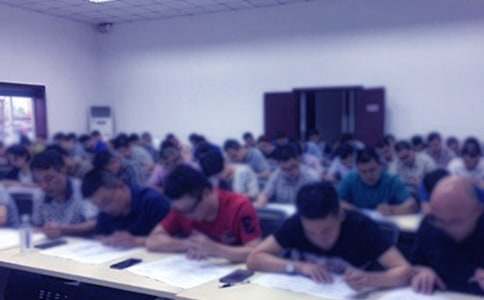2015年英语专业四级考试完形填空考前练习题
Someday a stranger will read your e-mail without your permission or scan the websites you’ve visited. Or perhaps someone will casually ____1____ through your credit card purchases or cell phone bills to fi nd out your shopping ____2____ or calling habits.

Who would ____3____ you without your permission? It might be a spouse, a girlfriend, a marketing company, a boss, a cop or a criminal. Whoever it is, they will see you in a way you never ____4____ to be seen — the 2lst century equivalent of being caught ____5____.
Psychologists tell us ____6____ are healthy, that it’s important to reveal yourself to friends, family and lovers ____7____ stages, at appropriate times. But few of them remain today. The ____8____ bread crumbs(面包屑 )you leave everywhere make it easy for ____9____ to reconstruct who you are, where you are and what you like. In some cases, a simple Google____10____ can reveal what you think. ____11____, increasingly we live in a world where you simply cannot keep a secret.
The key question is: Does that ____12____? For many Americans, the ____13____ apparently is “no”. When asked about privacy, most Americans say they are concerned about ____14____ it. A survey found an overwhelming ____15____ about privacy, with 60 percent of respondents saying they feel their privacy is “____16____ away, and that bothers me.”
But people say one thing and do ____17____. Only a tiny fraction of Americans change any ____18____ in an effort to preserve their privacy. Few people turn ____19____ a discount at toll-booths (收费站) to avoid using the EZ-Pass system that can ____20____ automobile movements. And few refuse supermarket loyalty cards.
1. A. glance B. browse C. read D. check
2. A. tendencies B. inclinations C. preferences D. aptitudes
3. A. see B. watch C. inspect D. supervise
4. A. imagined B. intended C. agreed D. proposed
5. A. hot B. red-handed C. exposed D. naked
6. A. respects B. restrictions C. self-protections D. boundaries
7. A. in B. at C. by D. with
8. A. messy B. digital C. numerous D. tiny
9. A. enemies B. criminals C. strangers D. companies
10. A. track B. search C. record D. download
11. A. Like it or not B. Believe it or not C. Make it or not D. Have it or not
12. A. work B. function C. match D. matter
13. A. truth B. answer C. problem D. concern
14. A. losing B. violating C. breaking D. depriving
15. A. optimism B. pessimism C. spiritualism D. materialism
16. A. sliding B. skidding C. slipping D. gliding
17. A. another B. the other C. others D. the others
18. A. habits B. mentalities C. manners D. behaviors
19. A. off B. away C. down D. back
20. A. chase B. hunt C. track D. pursue
文章大意
当今社会 ,个人信息的泄露是非常容易的一件事——个人邮件、上网记录、信用卡消费记录、手机账单 ,甚至是搜索记录都会向他人暴露我们不愿意他人知道的一面。虽然许多美 国人认为失去隐私是令人非常不安与不快的事情 ,但事实上许多人的行为却是在主动泄露 自己的隐私,如 :多数人为了得到折扣而情愿向收费站、超市等泄露自己的信息。
答案与解析
1. A
语义衔接题 。本句中 “casu ally ”一词表 明看 的人显得很 随意 ,因此用glance (快速地看 )比较合适 ;此外 ,另外三个词都是及物动词,后面不可用through 。
2. C
名词辨析题 。preference :喜好 ,根据后面的habit s可知该词较为合适。tendency :趋势 ;inclination :趋势,趋 向;aptitude :能力 。
3. B
名词辨析题 。前文提到了 “看 邮件 ,浏览 网站 ,看你 的购物记录及手机通话记录” ,这些行为都属于watch (监视 )。see :看到 ;inspect :审查 ;supervise :指导 。
4. B
语义衔接题 。他人通过上述方式窥视到的'信息 ,自然都是当事者从来不希望他人看到的那一面 ,因此intended (打算 ,意欲 )最符合上下文 。
5. D
语义衔接题 。因为别人看到的是自己不愿意被看到的那些东西 ,因此是 “caught naked (赤身**** )”,而非 “caught red-handed (在犯罪现场被捉 )”。
6. D
语义衔接题。根据 “healthy ”及后文 “应该在合适的时候 、分阶段让他人了解自己”可知 ,心理学家 的建议是人与人之间透露个人信息时应该有一个界限 (boundaries ),即他人不应该超越的范围,而restrictions意为“限制 ,束缚”,指外界施加的限定 。
7. A
介词搭配题 。in stages :分阶段 ;at the/this stage :在这个 阶段 。
8.B
语义衔接题 。因为上段和本段讲述的都是人们上 网或者现代金融 、通讯工具造成的个人信息泄露 ,因此此处是一个比喻 ,将这些电子工具 中的痕迹比喻为电子“面包屑”。
9.C
逻辑关系题 。他人可以根据你留下的信息碎片构建 出有关你的完整信息,从逻辑上看 ,这些完整信息stranger s (陌生人 )来说是了解他人的方式 。上下文中并没有涉及到敌人 、罪犯等 。
10. B
背景知识题。Google是一个搜索引擎 ,因此他人可以根据你的搜索内容知道你在想什么。
11. A
语义衔接题 。根据后句 “在这个世界 ,我们越来越无法守住秘密”,短语 “like it or not (不管你是否喜欢 )”更合适在这里作插入语 。believe it or not :无论你是否相信 ,也可作插入语 ,但不符合句意。make it or no (成功与否 )与have it or not (不管有没有 )不可以作插入语使用 。
12. D
语义衔接题 。根据后文 的 “no”以及许多美 国人在 日常生活 中并不介意放 弃个人信息以获得某种优惠的事实可知 ,这里问的是 “这要紧吗?”。
13. B
语义衔接题 。根据上句的 “question”一词 ,不难选出 “answer”。
14. A
动词辨析题。此空中填写的现在分词的逻辑主语为 “most Americans”,因此losing最为合适。violating(侵犯)与depriving(剥夺)意义不合适。breaking意味违反 。
15. B
逻辑关系题。根据原文可知 ,因为60 %的被调查者都对自己的隐私越来越少而深感不安 ,因此是一种pessimism (悲观主义 )的情绪 。
16. C
动词辨析题。这几个动词都有 “滑动”的意思 ,但slip还有 “(时间等 )不知不觉悄悄离开”的意思。slide意为 “在光滑的表面滑动”,也可以表示 “(人 )悄悄地溜走”;skid表示 “打滑”;glide意为 “(鸟、飞机等 )滑翔”。
17. A
固定搭配题 。one...another表示泛指的两者 。
18. D
名词辨析题 。 因为后文提到了美国人为获得折扣往往会选择提供个人信息 ,这属于behaviors(行 为 )。h ab it s :习惯 ;m ent alit ies :心理 ;manners :礼节 。
19. C
词组辨析题 。根据意义 ,这里应选择turn down ,意思为 “拒绝 (好意、建议等 )”。turn off :关闭。turn away :转过身 ,拒绝 ,如 :They never turn away the hungry. 他们绝不会把挨饿 的人撵走 ;turn back :回转 ,回头。
20. C
语义衔接题。根据上下文可 以猜测出 ,与收费站联系在一起 的EZ –Pass system应该是可以追踪(track )汽车的一种系统 。chase :追捕 ,追赶;hunr :打猎 ,驱逐 ;pursue :追赶,追求,都不符合句意。
http://www.cnrencai.com/【英语专业四级考试完形填空考前练习题】相关文章:
2015年英语专业四级考试完形填空练习题07-03
英语专业四级考试考前辅导07-11
英语专业四级完形填空常见词组03-03
英语专业四级完形填空答题技巧02-10
2017考研英语完形填空考前模拟练习题01-10
2018英语四级考试阅读理解考前练习题04-16
英语专业四级完形填空的应对方法02-26
英语专业四级完形填空解题技巧02-11
2017年6月英语四级考试完形填空练习题02-14
